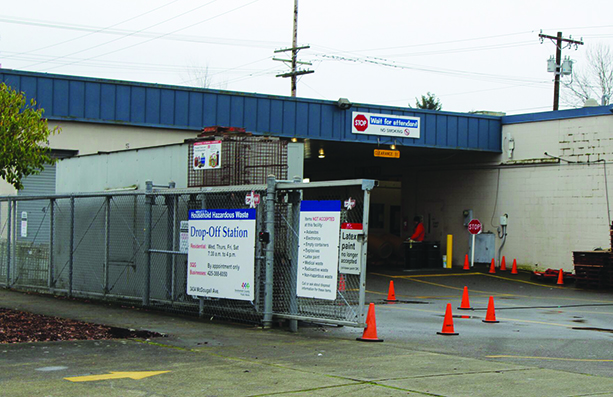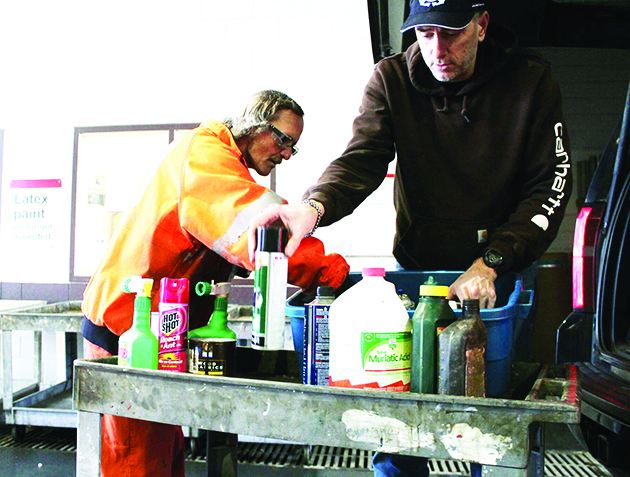By Kalvin Valdillez, Tulalip News
According to the Environmental Protection Agency (EPA), the average U.S. household generates more than twenty pounds of household hazardous waste (HHW) each year for an estimated total of 530,000 tons nationally. HHW items include products for your car, such as anti-freeze, motor oil and brake fluid as well as products around the house, like fluorescent light bulbs, paint, cleaning products and pesticides. These items are often accompanied by warning labels that read caution flammable, poison or corrosive. Improper disposal of these items, like pouring excess paint, oil or chemicals down the drain, in the trash or off the side of the road, are leading to serious concerns for Mother Earth and all of her inhabitants.
“For environmental pollution prevention purposes, trying to control storm water pollutants or toxins in the environment is paramount to folks who are interested in protecting salmon,” states Tulalip Planning Code Enforcement Officer, David Nellis. “It’s very important that we are working to prevent toxins like paint, spent fuels and these types of things from entering storm water runoff. When it rains, it hits paint that was spilled on the ground and the paint rushes off and gets into the creek and then flows downstream and salmon eggs get that covered on them. It’s either causing damage to the salmon eggs by affecting their DNA or killing them.”
At the turn of the 21st century, the EPA conducted a study which showed that pharmaceuticals and personal health care products (PPCP) in bodies of water were becoming an ‘emerging concern’ for fish. Overtime, the PPCPs bio-accumulate in the fish’s tissue, which can lead to endocrine system disruption causing reproductive and behavioral problems for the fish. Though that particular study did not focus on HHW like motor oil and paint thinner, it did show that the chemicals eventually work their way back up the food chain and now pose a problem for people.
“You can only eat an x amount of salmon and tuna now because of mercury; we have mercury in our light bulbs,” David explains. “These are called PBTs, or persistent bio-accumulative toxins, that the EPA tries to keep out of the environment. Some of them are in paints, light bulbs, and pesticides – a lot of these things we spray outdoors or spill accidentally. When they get into a body of water, they get into our body by getting into the bodies of the things we eat. And when that accumulates it can cause problems.
“The EPA states if you’re pregnant, you should only eat one meal of tuna a month,” he continues. “Because the level of mercury, it can interfere with the central nervous system development in children ranging from learning disabilities, to severe neurological damage to death being the worst case. What have we done? This is healthy food. We should be able to eat fish every day. All these things are impacted by things we put in the environment. Every salmon egg that dies is a salmon that won’t be smoking on the grill and providing food for ceremonies. Every one we can save, by not allowing pollution in the environment, will benefit our society. So, how can we make it better? By recycling and disposing these harmful products in a safe and proper way.”

Snohomish County provides free disposal of HHW products for their residents at the Household Hazardous Waste Drop-Off Station in Everett. The station accepts a variety of HHW products and is located at 3434 McDougall Avenue, off Broadway, a block adjacent to the Brown Bear Car Wash. The station collects and separates HHW to be recycled, consolidated and disposed of safely. They will also accept hazardous waste from small businesses that qualify as a small quantity generator, by appointment and for a fee.
“We take household items,” explains Ginger Swint, Moderate Risk Waste Specialist at the HHW Drop-Off Station. “Unwanted cleaners, pesticides, automotive, florescent lamps, and all batteries including car batteries. We don’t take sharps, radioactives, explosives, ammunition or empty containers. All the fluorescent [bulbs] are taken down to Seattle where they capture the mercury and phosphate, and the glass and everything else is recycled. I think this station is essential because it keeps [HHW] out of the waterways and away from children. It gives us an opportunity as a community to dispose of it properly instead of throwing it in the garbage.”
“They do chemical manipulation and restore it, reuse it in another product or dispose of it entirely in a way that doesn’t negatively affect our health and resources,” says David. “We can take some these spent fuels like for boat engines, you put additives in it and after a year it’s not good anymore, it kind of turns into lacquer. You can take all this stuff and take it to the household hazardous waste disposal site and give it to them. If you’re a private home owner they’ll take it for free and that gets it out of our waste streams. You’re essentially taking this massive pile of stuff that’s causing our demise – the demise of salmon, shellfish and poisoning people, and making it a little less than before. It’s more consolidated and compact. If we can try to remove some of these from the environment, then we can curb some of these man made problems.”
The Household Hazardous Waste Drop-Off Station is open Wednesday through Saturday between the hours of 7:30 a.m. and 4:00 p.m. To view a complete list of what the drop-off station accepts and does not accept please visit www.SnoCo.org
